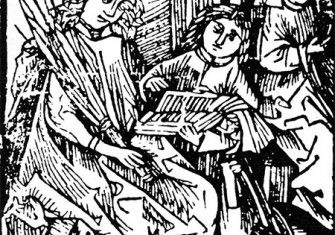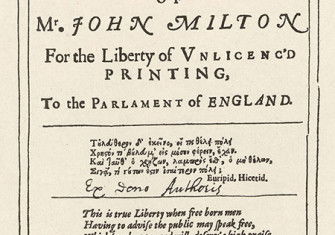Safe Spaces and Comfort Zones
Confronting the brutal facts of history can be difficult. But how far should we protect ourselves from them before it becomes censorship?
The Multicultural Affairs Advisory Board at New York’s Columbia University recently recommended trigger warnings be placed on Ovid’s Metamorphoses – and implicitly other classic texts in the western canon – because it contains material that is difficult for ‘a [rape] survivor, a person of colour, or a student from a low-income background’.
For those who do not know, a ‘trigger warning’ is akin to the descriptive notes that accompany DVD classification ratings. So, for instance, my copy of Edward Albee’s Who’s Afraid of Virginia Woolf is described as containing ‘intense scenes of verbal and physical abuse’.
The immediate cause of this pronouncement was a female student who had been sexually assaulted finding a discussion of the Persephone and Daphne myths traumatic in the classroom environment, which is entirely understandable.
Yet it is not to demean her pain when questioning whether the anxiety and distress she felt is sufficient reason to remodel the course for all students; or whether, more generally, we have the right to go through life without encountering texts, opinions and experiences that we find too emotionally difficult to deal with. As individuals we are surely entitled to evade distress. Whether we are entitled to demand society remodel itself around our trauma, to expect absolute public obeisance to the private tyrannies of our hurt is much less certain.
It is only a matter of time before such sensibilities are brought to the study of history, where we do not have the comfort of fiction or the consolations of literary aesthetics with which to distance us from the darkness.
The advisory board at Columbia was well intentioned, but to avoid discussion of sexual violence, racism and oppression is not to fight such evils; it is to pretend that there are public spaces in which they cannot exist. To live in a prison of your own design does not make you any less of a prisoner.
Is this not contrary to what the study of literature and history is about? Surely both are at least in part concerned with understanding how and why horror rises in the human heart, about the ebb and flow of power and resistance, of humanity against inhumanity, the moral and political struggles of individuals and societies, the fight of hope and faith against hunger, fear and death? Are not both subjects ultimately about the infinitely complex varieties of experience flowering endlessly into events, patterned yet unique, as we all are?
This desire to dissociate from reality is not a problem unique to education. It seems endemic in society, from the section of the US population which turns to Fox News or the Drudge Report for information, to the echo chambers of the bourgeois political elite which led the UK Labour party to its worst electoral defeat since the war. No party has a monopoly on moral squalor. It is a human characteristic, not a political one.
Characteristic of the mindset is the othering of your opponents, delegitimising contrary and challenging opinions by demonising those who hold them. There seems to me little intellectual difference between those who consider Barack Obama a socialist dictator because he believes in the efficacy and virtue of government and those who privilege the most reactionary elements of Salafi Islamic thought over women’s rights because opposition to any aspect of Islam is de facto Islamophobic. How far are we from declaring parts of literature or history hate speech? Not far enough.
It is the historian’s duty as much as the novelist’s or poet’s to understand what people think and why. We must resist anything that pushes us towards the comfortable and the familiar rather than challenges us with the arbitrary and exceptional.
Neither serenity nor strength come from avoiding difficult thoughts and feelings. Experience inures us; only by accepting reality can we begin to change it. Safe spaces and comfort zones, whether emotional or intellectual, may be invaluable for dealing with personal trauma, but they diminish us all if they do not equip us for the multiplicity of the world as it is.
Mathew Lyons is author of The Favourite: Ralegh and His Queen (Constable & Robinson, 2011). Follow him on Twitter @MathewJLyons






